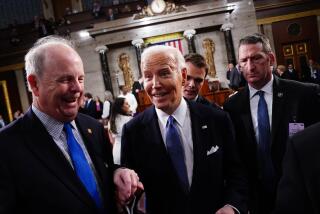NEWS ANALYSIS : Bush’s Speech Curiously Dry, Devoid of Eloquence : White House: Leaks may have prompted the President to rush his TV talk into production.
- Share via
WASHINGTON — The White House was calling it the most radical shift in American military policy in 40 years.
But in the hands of President Bush, the prime-time speech announcing an epic decision to shrink the nuclear arsenal was a dry recitation delivered without any reach toward eloquence, any clarifying visual aids or even much effort to simplify the military jargon.
Until Friday morning, the President had not even intended to televise the speech.
Once he made the decision, he chose precision over drama as he spoke of “taking . . . steps to permit the limited deployment of non-nuclear defenses to protect against limited ballistic missile strikes . . . without undermining the credibility of existing deterrent forces.”
Why Bush changed his mind, and why he delivered the speech as he did, says much about his presidential style and the complex way in which the Bush White House uses the media.
A Friday is the second-worst evening of the week for finding potential viewers at home. During the time period the President chose, 8 p.m. on the East Coast, most of the TV audience consists of children watching ABC’s “Family Matters.” On the West Coast, most people are not home from work.
The Saturday morning newspapers, furthermore, are the least-read papers of the week. Perhaps Bush’s only journalistic advantage will have been in persuading the news weeklies, which finish writing and editing Friday evening, to put him on the cover.
“He continues to be stronger on policy than on communication,” said David Gergen, who was President Ronald Reagan’s communications director. “This was a speech that should have been allowed to marinate for two or three days so it could be turned into prose that Americans can understand.”
What happened apparently was this: The White House did not involve its communications staff in this plan until Thursday evening, hours before Bush intended to unveil it Friday in a speech at a local university. The White House communications department urged that the speech be moved to prime time, perhaps Sunday.
But news of the plan, already discussed with allies, had begun to leak out. The Washington Post, for example, had a rough outline in Friday’s paper. Concerned that the piecemeal leaks would subject the plan to earlier analysis and hurt the President’s ability to frame it in his own way, the Administration released it Friday evening. Both Defense Secretary Dick Cheney and presidential spokesman Marlin Fitzwater acknowledged that concern over leaks dictated the choice.
This left the President with little time to prepare the speech, organize visual aids typical of most major presidential addresses of the TV age or even refine the speech’s rhetorical style.
Usually on days of a prime-time Oval Office address, the President has read the speech by 3 p.m. Eastern time to determine its length and notified the networks accordingly. But on Friday the networks still had heard nothing by 5:30, a sign, as one senior executive put it, “that they haven’t finished writing it, and he hasn’t read it yet.”
In the end, this may not be so important to Bush. Unlike Ronald Reagan or even Franklin D. Roosevelt, Bush does not try to bypass the print media and speak directly to the American people, so a soaring tone and seamless delivery are not so critical.
To a large degree, Fitzwater has said, Bush concerns himself more with print, the medium with which he is most comfortable.
Still, this speech had a peculiar feeling to it. “My first comment when I heard about this this morning was, ‘Is this all there is here? I must be missing something,’ ” said Steve Friedman, the executive producer of NBC Nightly News. “No one can figure this out.”
More to Read
Get the L.A. Times Politics newsletter
Deeply reported insights into legislation, politics and policy from Sacramento, Washington and beyond. In your inbox twice per week.
You may occasionally receive promotional content from the Los Angeles Times.









